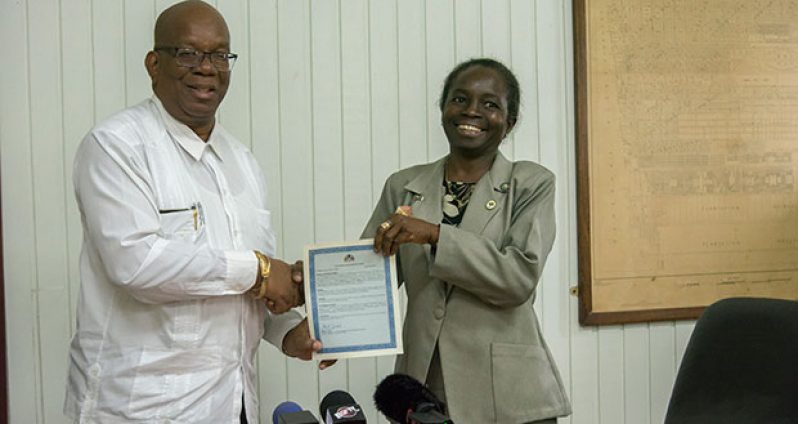…for failed investment in CLICO
By Shauna Jemmott
IT was indeed a happy day for the National Insurance Scheme (NIS) on Friday when government signed a Debenture Agreement of over $5.6B to repay the social security agency for losses suffered when the Colonial Life Insurance Company (CLICO) collapsed back in 2009.

Minister of Finance Winston Jordan said the NIS had lost billions of dollars in the investment and CLICO’s famous bankruptcy has had “traumatic effects” on the various parties involved.
Minister Jordan said government stood to its campaign for NIS’s repayment during the reign of the last regime, and has now decided to “give NIS as close as possible to what they invested in CLICO in close to 20 years.”
Declaring that it is “a happy day for NIS,” he said he hopes that NIS has learnt its lesson about “reckless investment.” “It is a sad day for taxpayers,” the minister said, and added that the taxpayers are the ones to bear the burden of the payments, which will be made over the next 20 years.
Each of the 20 debentures has already been prepared and an agreement signed by Minister Jordan and NIS General Manager Doreen Nelson, who was handed the first of 20 and a copy of the signed agreement yesterday.
The others will be collected in January of each year until 2037, with an accumulated value of $5,641,431, 475. Nelson said “We are extremely happy… this is a timely intervention.”
She was thankful to government and the Ministry of Finance and said at a time when NIS has been stumbling financially, the repayment will guide them into a brighter future. Back in August, Jordan had announced that NIS would receive $5.6B from the Government of Guyana as compensation for the financial loss suffered as a result of an investment made in the now bankrupt Colonial Life Insurance Company (CLICO).
Jordan had disclosed during a media briefing that Cabinet consented to repay the NIS through non-negotiable debenture certificates. The repayment would be made over a 20-year period at a fixed interest rate of 1.5 per cent per annum, the principal sum being four billion, eight hundred and eighty-two million, four hundred and forty-six thousand, one hundred and ninety-nine dollars ($4,882,446,199).
He said yearly payments are to begin from January 1, 2017, and at the end of the 20-year period, Government would have paid over five billion, six hundred and fifty-one million, four hundred and thirty-one thousand, four hundred and seventy-five dollars ($5,651,431,475) in terms of principal and interest.
“It is the best that the Government can do at the moment, but it is substantially more than NIS would have had if this investment continues to be impaired,” Minister Jordan said.
The decision to repay the NIS followed a motion by the People’s National Congress Reform (PNCR), when in opposition, to call upon the then People’s Progressive Party/Civic (PPP/C) government to take all steps necessary to guarantee that policyholders of CLICO Guyana would suffer no financial loss. That motion, moved by then Opposition Leader Robert Corbin and seconded by Winston Murray, sought to have Government give an unequivocal guarantee to all contributors and beneficiaries of the NIS that there would be no consequential loss in benefits to them as a result of CLICO’s bankruptcy; and that the Government, and not contributors, would take up the slack.
Resolution 82, passed by the National Assembly on March 12, 2009, called upon Government to take all necessary steps to ensure that there would be no financial loss to any policyholder or depositor of CLICO (Guyana); and to take all possible actions to secure the investments made in CLICO (Guyana) by the NIS on behalf of contributors and beneficiaries of the scheme, to prevent any consequential loss in benefits to them. The National Assembly had endorsed the statement by the government of the day, guaranteeing the savings, pensions, investments, and insurance of all investors, depositors, policy holders and contributors of CLICO (Guyana).
The Finance Minister said the NIS has been “impaired” as a result of the CLICO situation, and was finding it difficult to provide the beneficiaries with assistance. “NIS investments in CLICO are impaired, with extreme unlikelihood of getting back that money,” Jordan said, adding: “As a result of that impairment…not only NIS, but the beneficiaries in NIS are suffering terribly; because their ability to raise benefits will obviously be constrained by the fact that they don’t have this money, and this money cannot be put to earn additional monies for them.”
NIS invested more than $6B in CLICO (Guyana), and CLICO reportedly invested some US$34M in its Bahamian counterpart, which became liquidated. The liquidator of the CLICO (Bahamas) company said in 2010 that, based on a preliminary view of documentation, policies were not issued by CLICO Bahamas, and as such, premiums received from Guyana and Suriname were never paid to the Bahamian company.





.jpg)








